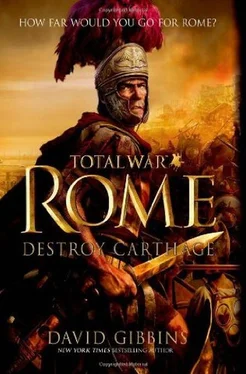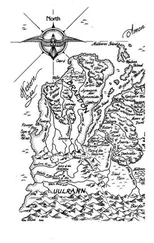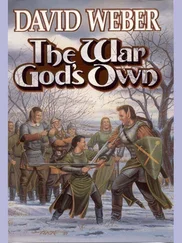David Gibbins - Total War Rome - Destroy Carthage
Здесь есть возможность читать онлайн «David Gibbins - Total War Rome - Destroy Carthage» весь текст электронной книги совершенно бесплатно (целиком полную версию без сокращений). В некоторых случаях можно слушать аудио, скачать через торрент в формате fb2 и присутствует краткое содержание. Год выпуска: 0101, Издательство: Thomas Dunne Books, Жанр: Исторические приключения, на английском языке. Описание произведения, (предисловие) а так же отзывы посетителей доступны на портале библиотеки ЛибКат.
- Название:Total War Rome: Destroy Carthage
- Автор:
- Издательство:Thomas Dunne Books
- Жанр:
- Год:0101
- ISBN:нет данных
- Рейтинг книги:5 / 5. Голосов: 1
-
Избранное:Добавить в избранное
- Отзывы:
-
Ваша оценка:
- 100
- 1
- 2
- 3
- 4
- 5
Total War Rome: Destroy Carthage: краткое содержание, описание и аннотация
Предлагаем к чтению аннотацию, описание, краткое содержание или предисловие (зависит от того, что написал сам автор книги «Total War Rome: Destroy Carthage»). Если вы не нашли необходимую информацию о книге — напишите в комментариях, мы постараемся отыскать её.
Total War Rome: Destroy Carthage — читать онлайн бесплатно полную книгу (весь текст) целиком
Ниже представлен текст книги, разбитый по страницам. Система сохранения места последней прочитанной страницы, позволяет с удобством читать онлайн бесплатно книгу «Total War Rome: Destroy Carthage», без необходимости каждый раз заново искать на чём Вы остановились. Поставьте закладку, и сможете в любой момент перейти на страницу, на которой закончили чтение.
Интервал:
Закладка:
‘Enough of this,’ Scipio said to Fabius. ‘However we do it, we need to get onto that parapet.’
‘No need.’ Fabius had caught sight of someone familiar out of the corner of his eye. There was a swooshing sound over the men, and the Nubian reeled and then fell forward, an arrow in his forehead. Enraged, Hasdrubal drew his sword and chopped the legs off the fourth prisoner, leave him to bleed out copiously over the parapet, and then he hastily moved out of sight. The legionaries in the square parted to make way for Gulussa and Hippolyta, who had been with their cavalry on the plain outside the city but had led a dismounted party up from the breach that had been made in the landward walls. Hippolyta was wearing the skin of a white tiger beneath a Roman cuirass, and her red hair was bound in a tight knot behind her helmet. She held her bow with another arrow ready, and looked over at Scipio. The four prisoners on the poles were groaning, terribly mutilated. The senior centurion of the first maniple turned to her, his voice hoarse with emotion. ‘Put them out of their misery,’ he said. ‘They will thank you for it.’ Scipio nodded, and Hippolyta raised her bow and in quick succession shot an arrow into the heart of each man, killing them quickly and mercifully. Fabius closed his eyes for a moment, trying to forget the scene. He could see the legionaries looking restless, uncertain. It was essential that they regain the momentum of their charge up from the harbour, or else they would falter and be cut down as they followed the side alley up towards the Byrsa that he and Fabius had seen on the reconnaissance three years before.
It was his job as primipilus to take the initiative in situations like this, to restore discipline. He leapt up on a stone grain bin and turned to address the men. ‘Legionaries,’ he bellowed. ‘Our comrades watch us now from Elysium. They wear full armour and are decked with the dona militaria of heroes. Now we go forward. There is a way up the alleyway to the acropolis. Our comrades will be avenged.’ He looked at the senior centurion of the first maniple. ‘Form the testudo, ’ he bellowed.
The centurion ran out in front of his men, turned to face them and raised his shield above his head. Instantly the first line copied him, locking their shields together to form a solid mass above their heads, and then on down the ranks as the cry of ‘Testudo’ went up from the other centurions until the entire force formed one continuous mass of shields. The centurions ran to the front and the rear and joined the formation just as the Carthaginians began pouring boiling olive oil down on them from the parapet, causing grunts of pain but no disorder in the line. Ahead of them the alleyway was clear of defenders for at least two hundred paces, but Fabius knew that the mercenaries on the walls and the warriors of the Sacred Band would come down and attack once they realized that the testudo was all but impregnable to anything they could drop on it.
Fabius and Scipio raised their shields above their heads and ran forward. Behind them they could hear Brutus pounding along the stones, and he soon overtook them. After about fifty paces they saw the first of the enemy in the alleyway, a mixed lot of mercenaries with the armour and weapons of half a dozen nations, Latins among them. Brutus charged headlong into them, his huge curved sword slashing to the left and right, slicing men in half and spraying their innards over the walls. The first victim of his fearsome cross-stroke was a Celtiberian who made the mistake of standing his ground. Brutus paused for a moment, eyeing the man up and down, and then with shocking speed swept his sword through the man’s exposed midriff, cutting him in half, and then up between the man’s legs to quarter him, drawing the sword right up through the neck and head. Fabius had seen it once before in practice on a prisoner but was still horrified by the result, an indescribable mess in the narrow confines of the alley. Ahead of him the mercenaries who had seen Brutus at work turned and retreated, bunching up together and inadvertently making themselves easier for him to kill, while others darted away on either side in a suicidal run towards the advancing legionaries; they would know they had no chance of survival, but could hope for a less gruesome end than the one being experienced by their comrades further up the alley.
A Carthaginian of the Sacred Band appeared suddenly in front of Fabius, breathing heavily, his sword at the ready. There was a sound like a rope snapping in the wind and the soldier lurched forward and swayed, a look of incomprehension on his face. Out of the corner of his eye Fabius saw something like a snake’s tail slither back down the stone steps of the alleyway. The Carthaginian dropped his sword with a clatter and his neck erupted with blood, spraying Fabius’ breastplate and face, and the man then tumbled and fell, the blood pumping out of his body and streaming down the cracks between the stones. Fabius glanced back and saw Gulussa coiling his whip for another strike. He remembered the day in Rome when King Masinissa had presented Gulussa with the rhino-skin whip, a memento of his time fighting alongside the elder Scipio that he had hoped his son would use once again in war with Carthage. That time had come but, fifty years on, the whip was meaner, more vicious. Gulussa had taken it back to Numidia and had his craftsmen splice razor-sharp steel blades into the tip, and then had honed his skills deep in the desert, fighting on camelback, in dust storms, in places that seemed to Fabius barely imaginable. He had returned to Rome with his skill perfected: the ability to use the whip to ring a man’s neck at twenty paces and slice through both jugular veins at once.
The whip flicked out again like a lizard’s tongue, uncoiling slowly at first and then lightning quick, this time striking a Carthaginian on the base of his helmet and slicing through his lower jaw. The man screamed in agony, dropped his sword and held his severed jaw to his face, spitting and spraying blood. Scipio leapt forward for the kill, thrusting his sword hard under the man’s kilt, pushing up from the groin as far as it would go and then twisting and pulling it out, jumping back while the man vomited blood and fell to the ground, dead. Fabius slipped on the slew of blood and bile that pumped out between the man’s legs and then righted himself and ran forward behind Scipio. Hippolyta was beside him now too, pulling arrow after arrow from her quiver, using her double-curved Scythian bow to place shots expertly in the neck where the enemy armour left them most vulnerable. Body piled upon body, yet still the Carthaginians came. Ahead of them Brutus scythed his way forward, leaving mutilated bodies and body parts on either side, bloody hunks of meat that piled against each other in the gutters as if they had been swept down from some butcher’s shop in a mighty deluge of blood.
They were coming to the end of the alleyway now; the walls on either side were funnelling them towards the cluster of tightly packed houses, the old quarter of the city at the foot of the acropolis. Word had reached Ennius on the ships to halt the creeping barrage of fireballs ahead of the legionaries while they were advancing so quickly, but now the signallers had instructed him on Scipio’s command to renew the barrage and pulverize the old quarter of the city before they reached it. The fireballs landed with renewed ferocity, the first ones so close that they made the ground shudder, others landing further ahead among the houses as the observers signalled back to correct the range. Above them on the walls, the Carthaginians were still flinging down rocks, pottery vessels, burning oil, anything they could get their hands on, but most of the missiles were bouncing harmlessly off the testudo formation as the legionaries moved inexorably forward, their shields interlocked over their heads. Behind them Hippolyta’s Scythian archers were finding their mark, felling the Carthaginians on the wall and adding even further to the mounds of corpses that littered the alleyway. Still the legionaries marched on, relentlessly, the clanging of their armour punctuated by the hoarse shouts of the centurions, the testudo narrowing to a width of only four or five shields as they approached the end of the alley, their swords drawn and ready.
Читать дальшеИнтервал:
Закладка:
Похожие книги на «Total War Rome: Destroy Carthage»
Представляем Вашему вниманию похожие книги на «Total War Rome: Destroy Carthage» списком для выбора. Мы отобрали схожую по названию и смыслу литературу в надежде предоставить читателям больше вариантов отыскать новые, интересные, ещё непрочитанные произведения.
Обсуждение, отзывы о книге «Total War Rome: Destroy Carthage» и просто собственные мнения читателей. Оставьте ваши комментарии, напишите, что Вы думаете о произведении, его смысле или главных героях. Укажите что конкретно понравилось, а что нет, и почему Вы так считаете.












